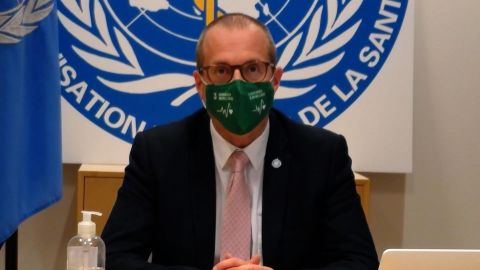Read Transcript EXPAND
CHRISTIANE AMANPOUR: I want to ask you then what you think governments should do because many, many citizens have not obeyed the — not the law but the suggestion to wear masks, to socially distance, and now, we’re on the brink of yet more — much more severe restrictions.
DR. HANS KLUGE, W.H.O., REGIONAL DIRECTOR FOR EUROPE: Right indeed. This are pandemic times in Europe, no doubt, but it doesn’t mean this are dark times. We see that a number of daily cases increased two to three times higher than in the peak in April. However, the deaths are still five times lower and the doubling time in hospitalizations is also two to three times lower. So, what we see basically is a steeper curve but the slope is slower. So, in that sense, we know what has to be done. A proportionate targeted response by the government and by the people to take the window of opportunity because, is there reason for panic be? No. Is there reason for concern? Absolutely.
AMANPOUR: OK. So, that’s really interesting because it looks like several governments are panicking. There are all sorts of, you know, this country has gone into a three-tier system, you know, kind of red, yellow, green. They are talking about, you know, increasingly difficult lockdowns. What should they be doing then? If you say don’t panic and the good news you say is the deaths are not as spiking as they were before. I mean, if you look at Paris, for instance, they say 90 percent of their intensive care beds will be filled by the end of next week. So, what should a country like France or Britain or others that are reporting spikes be doing right now?
KLUGE: Right. Absolutely, Christiane. Of course, I’m speaking of a European perspective, 53 countries. So, the top highest countries, I mean, absolutely. All hands-on board. We still see that the transmission is particularly in younger age cohorts, but what we have to avoid is that it’s spreading to the elderly age group because then mortality will spike very quickly. It has to be in a stepwise approach. And countries which are far off, of course, have to go for a much more stricter package, and this can go from daily working to absolutely, I will advocate for systematic and general mask-wearing, strict control on social gatherings. We know that with general mask wearing, both public and private, and strict control in social gatherings, we will be able to save 300,000 lives in six months in the 53 European countries.
About This Episode EXPAND
Former Sen. Carol Moseley Braun weighs in on the Amy Coney Barrett hearing. The W.H.O.’s Regional Director for Europe discusses the disastrous second wave of the pandemic. Sleep scientist Matthew Walker explains how to get better rest in these uncertain times. National Urban League CEO Marc Morial explains how the cities can rethink healthcare and housing in the post-COVID-19 future.
LEARN MORE



